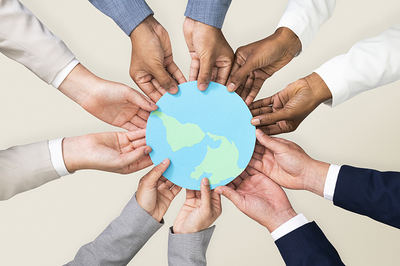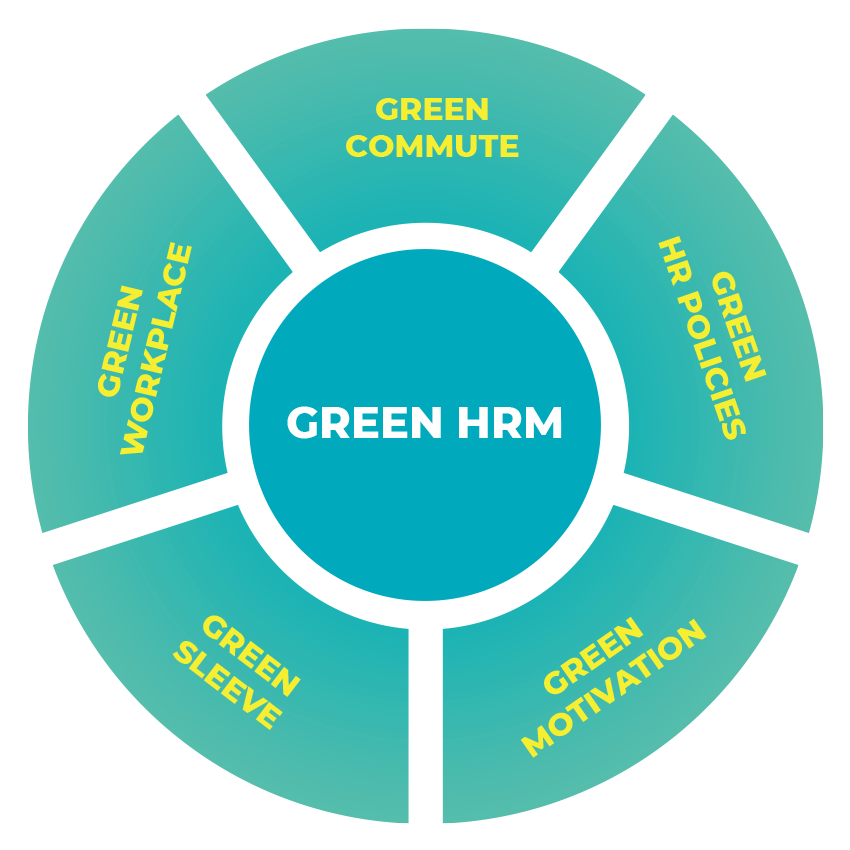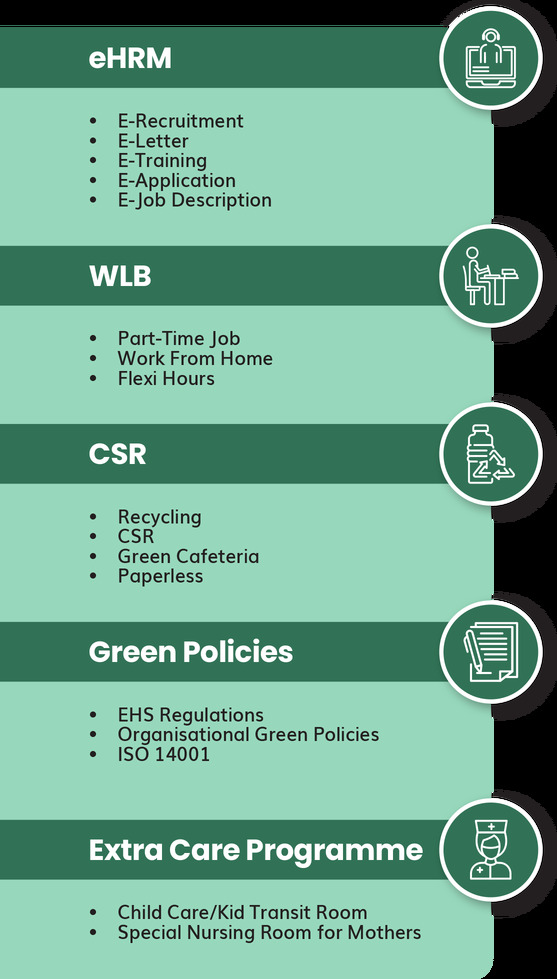Staying Green in the Human Era
By: Helen Selvanathan

In the peak age of climate change, organisations focusing more on sustainable development can help make the world a better place.
Our Malaysian economy has been striving to be dynamic for some time now. In that pursuit, one of the growing aspects has been the concept of business management involving conscious activities oriented not only at financial and economic gain but also at social and ecological interests.
Sustainable development is becoming an imperative part of the contemporary world, and many decision processes of organisations and entrepreneurs are leaning more and more towards environmental corporate responsibility. The Green Human Resources has become a priority instead of a nice-to-have in many organisations. “The Green Workforce” includes Human Resource strategies, culture, recruiting and retention, training, career path development, and diversity.
The importance of green recruitment and selection is now being taken into consideration by companies. HR professionals are taking a great deal of interest in attracting and retaining talented workers, especially those who have knowledge about environmental awareness. It is estimated that over 60% of companies in Malaysia have talent recruiters who are requested to apply a multidisciplinary approach and a systematic way of assessing talents that would build resilience towards sustainability development.

Not Just a Certificate Endorsement
Going Green is no more a mere certification or a brand, but it is becoming the way of life. In the work world, it starts even before an employee is hired until the employee leaves the organisation. Most organisations have leveraged Green HRM with prime importance to achieve broader objectives such as cost-saving, improving corporate social responsibility and making companies more future fit.
The world is undergoing a steady change towards business progress and injecting positive effects on society and the environment. Scholars, environmentalists and leaders are piping in the message of Sustainability as it has multiple benefits, including the following:
- Reducing labour turnover and supporting employee retention
- Increasing a company’s brand equity and market presence, including rising in sales
- Lowering overall costs of a company by adopting more efficient use of energy, water and other materials
- Stakeholder engagement improves as the future is in performance and competing better in today’s hyper-competitive market
Green human resource management enhances the quality of the overall organisation, both internally and externally. It is not merely a certification endorsement but a long term sustainable HR strategy of making a difference towards now and the future.
Human Resources’ Responsibility Transcends Boundaries
The responsibility of business in managing HR goes beyond its corporate boundaries and past the current times. Simply put, corporations are equally responsible not only for the people they employ but also for the communities in which they operate and indirectly employ in their supply chains. Therefore, organisations need to have the purpose of implementing socially responsible human resource management to minimise negative impacts and reduce business risks.
The outside-in perspective players usually are keen on “how can a business use its people, their experiences, expertise, competencies in a way to make them useful for addressing more impactful matters?” For instance, the climate, corruption, water, poverty, pandemic, youth unemployment, financial instability and other social, and environmental challenges.
Malaysian Corporations to Prioritise Multi-Dimensional Sustainable HRM Model
Are we in Malaysia ready for the “next” wave or “new” wave of Human Resources priorities? A focus that approaches for an integrated system of value mutuality that can bridge strategic versus human, economic rationality to ultimately achieve the desired human resources outcomes of performance, fairness and social legitimacy.
Malaysian companies need to look at a multi-dimensional Sustainable HRM model that will take into long-term focus influences including urbanisation, workforce demographics, and biodiversity instead of simply quarterly returns, addressing short term financial and market-driven issues.
More and more natural resources and social capital are seen as valuable assets on par with our economic capital. These resources can be recognised as needing the appropriate and right protection through increasing development of “people management practices” that take additional development of environment and human capital into account.
Adaptation of Green HRM Policies
Broadly, the Green HRM can be categorised into narrowed concepts of e-HRM, Worklife Balance, Green Policies, Extra Care Program and Corporate Social Responsibility.

Besides, the Pandemic has caused a challenging period for human resource management, with many managers being forced to step into unknown territories to support the best of people management.
During this period, the findings of many HR teams are that compensation is not entirely applied in supporting a pro-environment employee culture. Instead, organisations are more focused on aspects of production and customer service.
The aspect of reward and appreciation is not widely used for promoting environmental behaviour. However, in most organisations, it is a specific group of people who are passionate about the matter that continues to be advocators.
The insufficient utilisation of the right compensation is because the employees are supported for many reasons and have no relationship with the environmental objectives that the organisation has set.
Therefore, it is important for organisations to study and provide a better long-term initiative on green HRM and support environmental performance by considering both employee and organisation interests.
Noticeable emerging trends in eHRM for 2022 are centred around:
- Placing Company Purpose and People – to Work Together
- Ensuring Mental Health as Part of Key to Business Growth
- Changing the Traditional Workstyle – Rethinking Traditional Workplace
- Supporting Digitalisation Beyond the Pandemic, Endemic Period



Green HRM advocates for Work-Life Balance, where employees are encouraged to work remotely at flexible hours and commute using public transportation.
Organisations in Malaysia That Have Successfully Made a Pact with Sustainability
Some of the notable organisations in Malaysia that have embarked on and reported sustainability in their eHRM include Ecoworld Development Group Berhad. For example, they introduced their Zero tolerance on bribery and corruption policy via an e-learning course that all employees completed. In addition, in their 2020 Sustainability report, we can read that Ecoworld has provided opportunities to encourage employee career growth and personal development through a series of eTraining, which stresses the importance of a healthy work-life balance.
Similarly, OSK Holdings Berhad shared in their report that they have an 87.5% year-on-year increase in training hours per employee. The total training hours per employee increased to 15 hours in 2020 compared to 8 hours in 2019. All these are made possible online; learn at your pace e-training modules.
Small Steps to Take Into Practising Green Behaviour
Other organisations are starting to compensate employees who are practising green commutes. Compensation includes remuneration for employee’s e-vehicle, travel pass claim for train commuters and healthy safety measures for cycling to work.
At the tail end, these functions have to accommodate the interest of both individuals and organisation factors to be able to showcase what truly Staying Green in the Human Area entails.

About the Author

This article is an observation of Helen Selvanathan, Senior Director, Partner Go-to-Market, Software Solution Partners, SAP Asia Pacific & Japan. She supports business partners who innovate and build solutions that leverage SAP products. Helen also chapter leads at SEA for a global SAP employee engagement initiative known as SAP Business Women Network (BWN), which looks to develop SAP employees both in professional and personal aspects. She also supports the company’s efforts towards building a more sustainable and socially responsible world.







